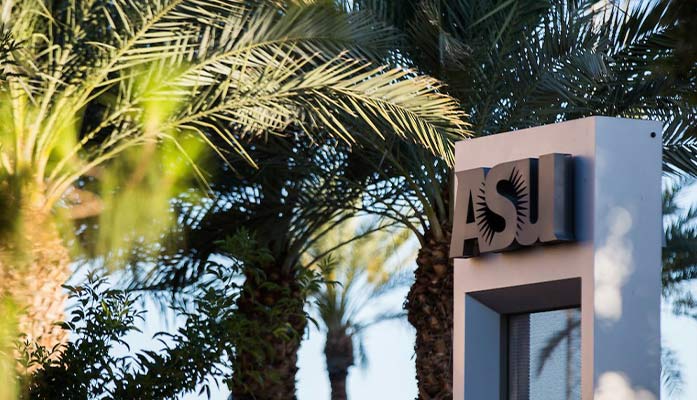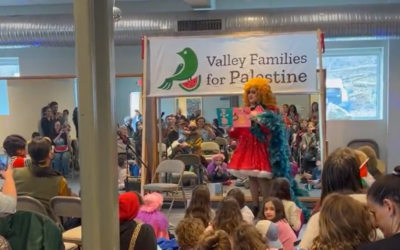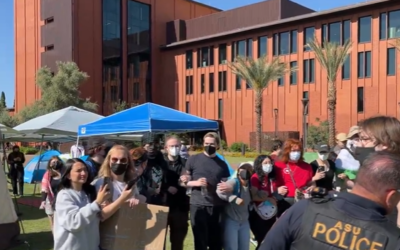By Corinne Murdock |
Arizona State University (ASU) has shut down a prominent free speech center and fired several faculty members following the protest of the faculty who opposed its existence.
The university decided to shut down the T.W. Lewis Center for Personal Development within the Barrett Honors College following a controversial event featuring conservative speakers hosted earlier this year.
The contested speakers were nationally-acclaimed conservative pundits Charlie Kirk, founder and president of activist group Turning Point USA; Dennis Prager, radio talk show host and founder of PragerU; and Robert Kiyosaki, author of a bestseller personal finance book and PragerU presenter. As AZ Free News reported in February, a group of 39 left-leaning ASU Barrett Honors College faculty led a campaign to prevent the event from happening, which included recruiting students to protest the event.
The two faculty members to lose their jobs following the controversial event were the executive director of the Lewis Center, Ann Atkinson, and the events operator for the Gammage Theater where the event was held, Lin Blake.
AZ Free News spoke with both Atkinson and Blake about their ordeal. Earlier this week, Atkinson came forward in a Wall Street Journal opinion piece criticizing ASU for caving to leftist restrictions on free speech.
“I wasn’t trying to do anything but my job: to do it well, and to keep people safe.”
For ASU’s Gammage Theater, Blake handled the arrangements for events such as calendaring, contracting, and client meetings. Throughout her career, Blake said she always offered the same respect and professionalism to clients, regardless of who or what was behind an event.
“Over the years I have booked and managed many types of events. Every one of them received the same level of professionalism,” said Blake.
Yet, it was Blake’s commitment to equal treatment in a venue designed for free expression that ultimately cost her the job — even though her superiors signed off on the event.
“Basically, I was sacrificed because Gammage executive staff had to do something to satisfy or appease the staff of Barrett Honors College. I was a scapegoat, and was let go at the beginning of April,” said Blake.
Blake recounted that her superior initially praised her for handling the controversial event. A bulk of essential personnel — security officers, backstage crew, and front of house — all called out, and police availability was limited severely due to ongoing staffing shortages and the Super Bowl occurring that same week. It was up to Blake to fill the gaps to provide a safe and successful event. By all accounts, she said she did — even her boss reportedly told her so, using a favorite phrase of his to describe her: “rockstar.”
By the next Monday, however, sentiments shifted. Blake said she walked into work facing a line of questioning. She was reportedly asked by her superior, ASU Gammage executive director Colleen Jennings-Roggensack, why she booked a “white supremacist,” an accusation leveled against the event speakers by opposing faculty. Blake was then required to get pre-approval from both Jennings-Roggensack and management prior to booking any future events.
Blake said the pre-approval amounted to a micromanaging that ultimately served to filter out who could and couldn’t host an event at Gammage.
According to Blake, Jennings-Roggensack had a habit of telling staff that they were aligned in beliefs, that they all had voted for President Joe Biden and Gov. Katie Hobbs — even if they hadn’t.
At a faculty and leadership meeting following the upbraiding from Jennings-Roggensack, Blake said she was singled out to explain Gammage’s core values.
After that, Blake described her remaining months at ASU as a “slow decline.” She was let go in April for “not being a good fit.”
Blake says she’s applied and interviewed for three other ASU positions. Each time, HR has sent her letters that they’re no longer hiring for the position — even though the positions remained posted as available.
“[This is] what happens to those who don’t conform to the prevailing orthodoxy on campus.”
Atkinson retained her position several months longer than Blake did. It was at the end of May that Atkinson learned from Barrett Honors College Dean Tara Williams that her position would end, and that the Lewis Center would be no more.
In an official statement shared widely by the press following Atkinson’s Wall Street Journal piece, an ASU spokesman claimed that the primary donor behind the Lewis Center, the T.W. Lewis Foundation, would no longer be funding the program. ASU also praised the controversial event as a success.
“Ms. Atkinson’s current job at the university will no longer exist after June 30 because the donor who created and funded the Lewis Center decided to terminate his donation. ASU is working to determine how we can support the most impactful elements of the center without that external funding,” stated the spokesman. “Arizona State University remains committed to, in practice, not just rhetoric, all things that support free speech and all of its components. The event in question was held and was a success.”
It appears that demonization by the vast majority of Barrett Honors College faculty over the Lewis Center event was the breaking point for T.W. Lewis Foundation’s founder, T.W. Lewis. He told The Arizona Republic that ASU’s environment is hostile to conservative thinkers.
“The long story short is that conservative viewpoints are not welcome at ASU. Or, at most public universities in America,” said Lewis.
The T.W. Lewis Foundation funds a number of other major conservative organizations and enterprises, such as GreatHearts Academies, Museum of the Bible, The American Conservative, Alliance Defending Freedom, Conservative Partnership Institute, Young America’s Foundation, Foundation for Economic Education, and the Heritage Foundation. They also fund the organizations from which the controversial speakers hailed: Turning Point USA and PragerU.
However, the foundation wasn’t the only funding source possible as ASU implied. Atkinson offered a diversified group of donors to offset the lost funding; she reported that Williams wasn’t interested. Atkinson also collected 18 pages of testimonials from students, families, and past guest speakers. That wasn’t enough to persuade, either.
“What ASU did not say is that the Barrett dean expressed no interest in continuing the Lewis Center,” said Atkinson.
AZ Free News reached out to Williams about the alternative funding. She didn’t respond by press time.
Atkinson believes that, ultimately, ASU policies have allowed this stifling of free speech to take place. Come fall, there will be one less place for free thought on campus.
“I want the right to free speech to our universities to apply to all people. What happened appears to be within the policies of the university,” said Atkinson. “The students lose. I’m devastated for the students. For so many of them, the 7,000 students in Barrett, this has been their home. Now it’s gone.”
As for next steps, Atkinson said she is taking everything one day at a time.
“I’m hoping to show the world what happens to those who don’t conform to the prevailing orthodoxy on campus.”
Corinne Murdock is a reporter for AZ Free News. Follow her latest on Twitter, or email tips to corinne@azfreenews.com.








